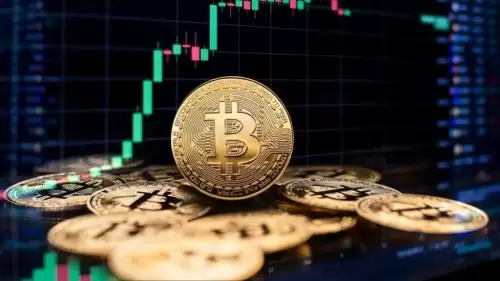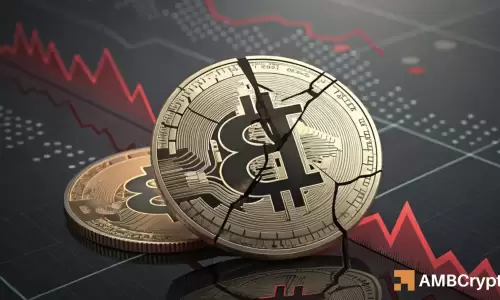 |
|
 |
|
 |
|
 |
|
 |
|
 |
|
 |
|
 |
|
 |
|
 |
|
 |
|
 |
|
 |
|
 |
|
 |
|
Nachrichtenartikel zu Kryptowährungen
The OP_RETURN debate: BTC's scripting language gets an upgrade
May 13, 2025 at 10:00 pm
A debate over OP_RETURN and mempool policy has been flaring up in the Bitcoin industry in recent weeks and has by now invaded most conversation spaces within the industry. The topic is rich and complex, and many people have strong opinions on the matter.
For those who missed it, OP_RETURN is an opcode in Bitcoin's scripting language used to store meta data or arbitrary data that is not relevant for bitcoin transaction validation, as such can be pruned by node runners without much issue, enabling more efficient management of spam while also giving developers a controlled environment to anchor data on chain.
Taking a harm reduction approach to the problem of spam, the OP_RETURN controversy was recently triggered by a pull request submitted by Peter Todd to the Bitcoin Core repository. The pull request removed the 80-byte mempool policy limit on OP_RETURN payloads, which in practice limited the size of arbitrary data that could be placed in the script to about 80 bytes. By removing this limit, the maximum size of an OP_RETURN payload is limited only by the consensus block size cap of 1MB of non-SegWit data.
Proponents of the update, such as Todd, argue that the limit is no longer effective at stopping spam and, on the contrary, is leading to more harmful behaviors such as stuffing data in UTXOs, which harm node runners.
The proposal also removed the datacarrier flag, a configuration option that allowed node runners to choose which transactions to filter from their local mempool based on how much arbitrary data the OP_RETURN carried.
The opposition, led by Luke Dashjr, not only wants to keep the OP_RETURN limit in place and retain the datacarrier size but proposes further mempool policy restrictions on arbitrary data and “non-monetary” transactions on Bitcoin.
Both camps generally agree that arbitrary data on Bitcoin is a bad thing for the network. They also agree that filters cannot possibly filter all kinds of spam. What they disagree on is how effective these kinds of filters are in mitigating spam. They also disagree on the consequences of imposing or removing these filters from the network, their impact on the costs of running a node, and their impact on mining centralization.
Of course, not all proponents of the OP_RETURN changes agree with all of the arguments in favor of the pull request, and not all opponents agree with all of the arguments against it. This is just a general (and probably incomplete) overview of the various arguments out there.
In Support Of Removing the OP_RETURN Size Limit
Spearheaded by Peter Todd, though supported by many Bitcoin Core contributors, the removal of the OP_RETURN limit represents a harm reduction approach to the problem of spam and arbitrary data on Bitcoin.
Todd argues that the current OP_RETURN limit, initially placed over a decade ago to give spammers a safe and controlled space for arbitrary data, no longer serves its purpose as companies and enthusiasts have developed direct-to-miner private mempools, such as MARA's Slipstream, that bypass mempool policy.
The OP_RETURN limit was put in place after Satoshi Nakamoto left, to protect the network from similar spam but during a very different era, when blocks were rarely full, much less boasting a high-fee environment. There were also few to no tools for pruning, and the software was very inefficient. Many optimisations have been implemented in the last decade, and their cumulative effects influence this debate.
The OP_RETURN limit was thus more effective when it was first created and more difficult to bypass. Today, NFT and arbitrary data enthusiasts with ambitious projects, pressured out of the OP_RETURN space by the current mempool limit, have resorted to stuffing arbitrary data into the UTXO set instead. Unlike OP_RETURN or SegWit spaces, which can be reasonably pruned off nodes, the UTXO set is generally held in RAM, the most expensive form of memory. The UTXO set needs to be processed by nodes, to verify the supply of coins and be able to validate the integrity of new transactions, a fundamental piece of running a node, without which home nodes lose much of their value proposition. UTXO data stuffing as a result imposes significant costs on node runners by increasing initial block download, overall sync time, and hardware requirements that ultimately harm the decentralisation of the Bitcoin network.
Finally, supporters argue that miners are “rational economic actors,” an economics term meaning that to stay alive in a very competitive market, miners need to optimise for profits wherever possible. Thus, if mining consensus-valid non-standard transactions gives them an edge, they will take it.
Back in 2023, Luke Dashjr proposed a change that sought to apply datacarrier mempool policy to SegWit and Taproot arbitrary data, such as Inscriptions, further restricting the options for spammers. Peter Todd opposed the PR, explaining that “The transactions targeted by this pull request are a very significant source of fee revenue for miners. It is very unlikely that miners will give up that source
Haftungsausschluss:info@kdj.com
Die bereitgestellten Informationen stellen keine Handelsberatung dar. kdj.com übernimmt keine Verantwortung für Investitionen, die auf der Grundlage der in diesem Artikel bereitgestellten Informationen getätigt werden. Kryptowährungen sind sehr volatil und es wird dringend empfohlen, nach gründlicher Recherche mit Vorsicht zu investieren!
Wenn Sie glauben, dass der auf dieser Website verwendete Inhalt Ihr Urheberrecht verletzt, kontaktieren Sie uns bitte umgehend (info@kdj.com) und wir werden ihn umgehend löschen.
-

- Velo Universe, Dex und Defi Security: Navigation durch die Zukunft des dezentralen Handels
- Aug 05, 2025 at 07:45 am
- Untersuchung der Entwicklung des dezentralen Austauschs (DEXS) mit Schwerpunkt auf Velo-Universum, Defi Security und der Verschiebung in Richtung benutzerorientierter, transparenter Handelsplattformen.
-

- Bitget Wallet revolutioniert Solana mit gasfreien Transaktionen: eine neue Ära für Defi
- Aug 05, 2025 at 07:36 am
- Bitget-Brieftasche führt dazu, dass Solana mit gasfreien Transaktionen zugänglicher wird und Defi für alle vereinfacht. Entdecken Sie, wie diese Innovation die Benutzererfahrung umgestaltet.
-

-

-

- Brian Armstrong von Coinbase und die Kunst des fokussierten Werks: ein tiefer Tauchgang
- Aug 05, 2025 at 07:11 am
- Erforschen Sie, wie der einzigartige Ansatz von Coinbase-CEO Brian Armstrong zur fokussierten Arbeit, einschließlich seiner jetzt berühmten Wiedergabeliste, zu seiner Führung und dem Erfolg des Unternehmens beiträgt.
-

-

-

- Bitcoin, Michael Saylor und Strategie: Ein Moloch der digitalen Transformation
- Aug 05, 2025 at 07:01 am
- Erforschen Sie die mutige Bitcoin -Strategie von Michael Saylor, die massiven Bestände von MicroStrategy und die sich entwickelnde Landschaft der Corporate Crypto Adoption. Fängt die Wall Street endlich ein?
-






























































